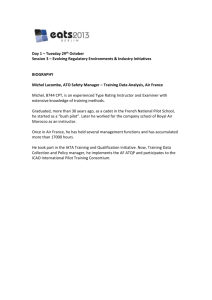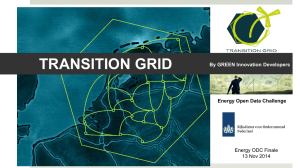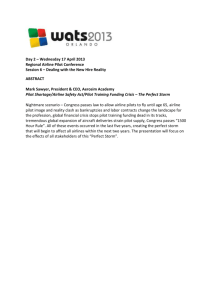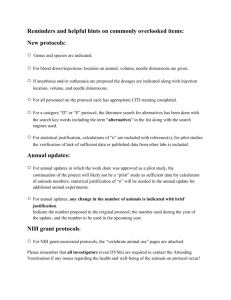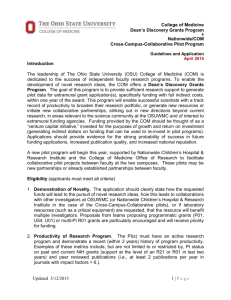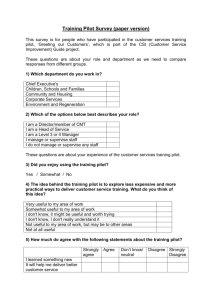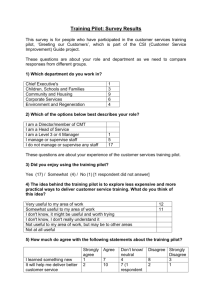Consortium of Eosinophilic Gastrointestinal Disease Researchers
advertisement
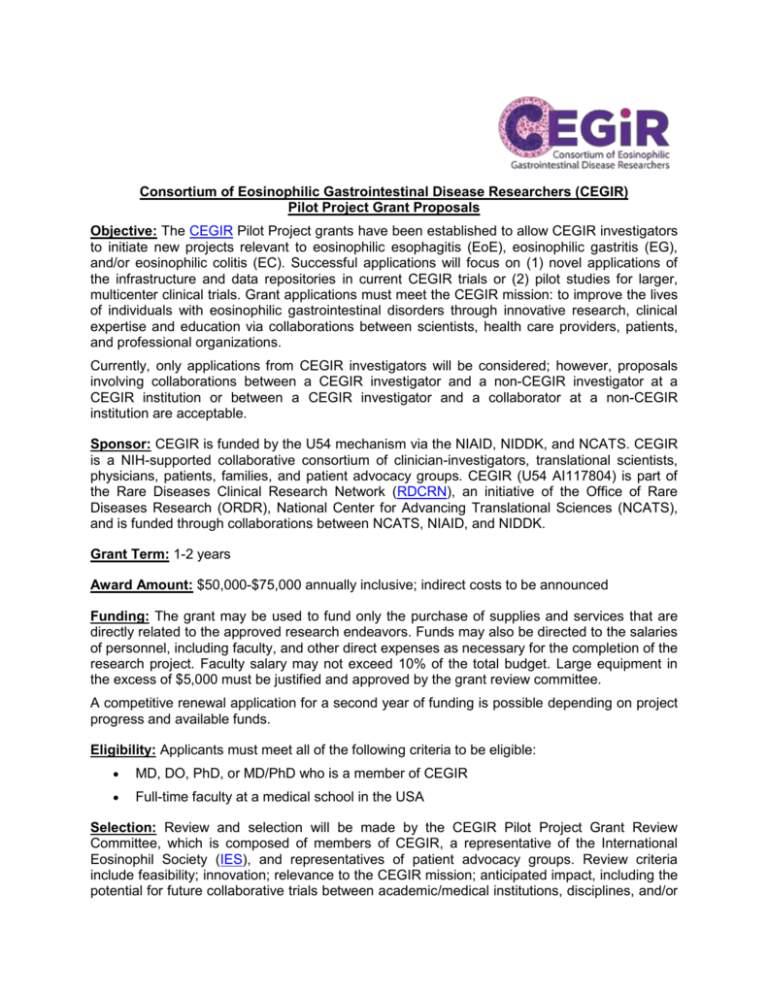
Consortium of Eosinophilic Gastrointestinal Disease Researchers (CEGIR) Pilot Project Grant Proposals Objective: The CEGIR Pilot Project grants have been established to allow CEGIR investigators to initiate new projects relevant to eosinophilic esophagitis (EoE), eosinophilic gastritis (EG), and/or eosinophilic colitis (EC). Successful applications will focus on (1) novel applications of the infrastructure and data repositories in current CEGIR trials or (2) pilot studies for larger, multicenter clinical trials. Grant applications must meet the CEGIR mission: to improve the lives of individuals with eosinophilic gastrointestinal disorders through innovative research, clinical expertise and education via collaborations between scientists, health care providers, patients, and professional organizations. Currently, only applications from CEGIR investigators will be considered; however, proposals involving collaborations between a CEGIR investigator and a non-CEGIR investigator at a CEGIR institution or between a CEGIR investigator and a collaborator at a non-CEGIR institution are acceptable. Sponsor: CEGIR is funded by the U54 mechanism via the NIAID, NIDDK, and NCATS. CEGIR is a NIH-supported collaborative consortium of clinician-investigators, translational scientists, physicians, patients, families, and patient advocacy groups. CEGIR (U54 AI117804) is part of the Rare Diseases Clinical Research Network (RDCRN), an initiative of the Office of Rare Diseases Research (ORDR), National Center for Advancing Translational Sciences (NCATS), and is funded through collaborations between NCATS, NIAID, and NIDDK. Grant Term: 1-2 years Award Amount: $50,000-$75,000 annually inclusive; indirect costs to be announced Funding: The grant may be used to fund only the purchase of supplies and services that are directly related to the approved research endeavors. Funds may also be directed to the salaries of personnel, including faculty, and other direct expenses as necessary for the completion of the research project. Faculty salary may not exceed 10% of the total budget. Large equipment in the excess of $5,000 must be justified and approved by the grant review committee. A competitive renewal application for a second year of funding is possible depending on project progress and available funds. Eligibility: Applicants must meet all of the following criteria to be eligible: MD, DO, PhD, or MD/PhD who is a member of CEGIR Full-time faculty at a medical school in the USA Selection: Review and selection will be made by the CEGIR Pilot Project Grant Review Committee, which is composed of members of CEGIR, a representative of the International Eosinophil Society (IES), and representatives of patient advocacy groups. Review criteria include feasibility; innovation; relevance to the CEGIR mission; anticipated impact, including the potential for future collaborative trials between academic/medical institutions, disciplines, and/or industry; and/or the use of previously generated CEGIR data to analyze novel hypotheses. Preference will be given to research projects that are the most likely to be productive. Terms: Recipients must acknowledge / adhere to the following terms: The CEGIR Pilot Project Grant is non-transferable. Receipt of the CEGIR Pilot Project Grant does not preclude the applicant from obtaining other grant support from other sources; however, other existing support cannot conflict with the requirements of the CEGIR Pilot Project Grant. Support from the CEGIR Pilot Project Grant must be acknowledged in all presentations and publications resulting from the CEGIR Pilot Project Grant sponsored research, “CEGIR Pilot Project Grant (U54 AI117804)”, and adhere to all NIH public access policies (e.g. PubMed Central deposition). The recipient must provide CEGIR Pilot Project Grant Committee reports on the progress of the research project at 3 months and at 6 months after the funding start date. These reports will be one-page summaries of what has been completed, what is currently underway, and what is planned. These reports will be emailed to Marc E. Rothenberg, MD, PhD (marc.rothenberg@cchmc.org) and reviewed by the CEGIR Internal Advisory and Review Committee. At the end of 12 months of funding, the recipient will also submit a final report, and/or funding continuation proposal, outlining the project results and anticipated next steps. The recipient is required to attend at least one CEGIR-sponsored conference, during the interim of their funding period or within a year after their funding period has ended, and present their project status and results. CEGIR may discontinue a grant if it is documented that the purpose and/or the terms of the grant are not being fulfilled. In this event, the recipient will be notified in writing of this determination, the reason, and the effective date. The information contained within CEGIR Pilot Project Grants will be treated as confidential material that will not be shared with members outside of CEGIR. CEGIR Pilot Project Grant Requirements: The proposal should be formatted as specified below and contain the following components assembled in the given order: Formatting: 11-point Arial font; single line spacing; all margins 1 inch (no information should appear in the margins, including the PI’s name and page numbers); PDF format Abstract: provide an abstract of the proposed project (maximum 30 lines of text adhering to the formatting specified above), including its public health significance, impact, and relevance to the mission of CEGIR. Applicant’s Statement of Purpose: state the applicant’s current and future EoE-, EG-, and EC-related research objectives including the planned future grant application(s) based on the pilot project (1-page maximum). NIH Biosketches (New 2015 5-page Format): provide NIH biosketches for the PI and all co-investigators and key scientific personnel. Overlap/Conflict-of-Interest Disclosure: include a full disclosure of all currently active grants or grants pending review or funding decisions and any potential conflicts of interest for the PI and all co-investigators and key scientific personnel, addressing overlap, if any, with the CEGIR Pilot Project Grant. Project Plan: provide a description of the project (maximum of 5 pages, not including references), including these sections: background, significance, innovation, long-term objectives, specific aims, and research strategy/experimental approach. Preliminary data, if available, should be included. Facilities and Resources: provide a description of the facilities for research and training needed by the applicant (1-page maximum). Detailed Budget and Justification: provide a detailed budget and justification. Purchase of equipment may be considered, if adequate justification is provided. Protection of Human Subjects: For grants involving human subjects, include a letter showing IRB approval of the study protocol or indication that the protocol has been submitted and is in review. If IRB approval will be needed and issued only in the event of funding, please specifically indicate this contingency. Institutional Support: provide an officially signed letter from the applicant institution's Office of Sponsored Research or similar, approving the submission and indicating the institution’s willingness to comply with CEGIR grant management and reporting requirements. Submission: Applications should be submitted by April 30, 2015 as a single PDF file attachment in an email to Melody Hess (Melody.Hess@cchmc.org). Applicants will be notified around June 15, 2015, and award funds will be initiated following regulatory approval by the NIH.
